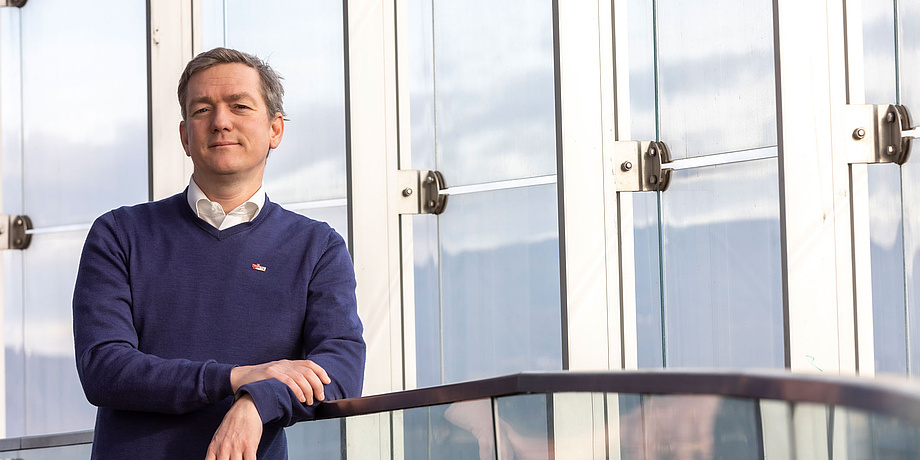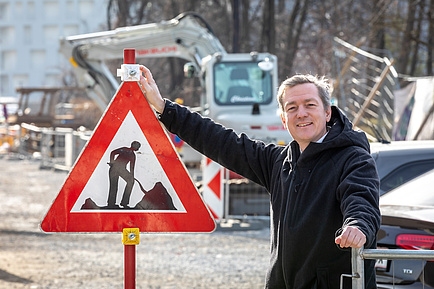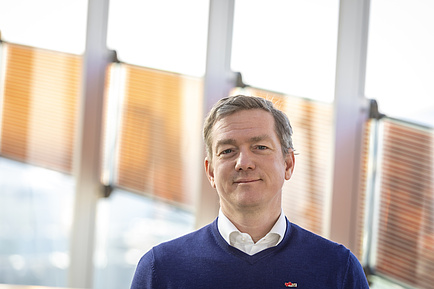Civil engineer Alexander Passer has long been intensively involved with the issue of sustainability in construction. He heads the Working Group for Sustainable Construction at Graz University of Technology (TU Graz), is the scientific head of the university course Sustainable Construction at TU Graz and TU Wien (Vienna University of Technology) and a board member of the Climate Change Centre Austria (CCCA). Recently, he was nominated as scientific adviser for the field of construction in the “Citizens’ Climate Council” set up by the BMK (Federal Ministry for Climate Action, Environment, Energy, Mobility Innovation and Technology). In the framework of the endowed professorship, which started in January 2022, Alexander Passer is now devoting himself even more intensively to the key topics of climate neutrality in the building industry, modelling of the building life cycle and methods of life cycle-based sustainability assessment.
“As a large single emitter of greenhouse gases, the construction sector holds enormous potential in the fight against the climate crisis. This is one of the areas where we really need to turn the tide. The establishment of the endowed professorship for Sustainable Construction and the appointment of the proven expert Alexander Passer will provide strong and important impulses for sustainable construction in research, teaching and building practice,” says a convinced Harald Kainz, Rector of TU Graz.
“Representing the Austrian building materials industry as we do, we give TU Graz our wholehearted support in establishing sustainable construction as a scientific subject with the endowed professorship. In our view, this creates ideal conditions for the development of practical sustainable construction methods, evaluation approaches and new models. We are happy to have gained an internationally recognized expert in Alexander Passer and look forward to working with him and his team,” adds Robert Schmid, chairman of the Stone and Ceramics Association.
The Trade Association of the Stone and Ceramics Industry will fund the professorship according to Section 99 of the University Act for a period of three years, with the option of extension. The establishment of the endowed professorship for Sustainable Construction underlines the sustainability of buildings as an independent scientific discipline. The professorship represents a central contact point for the building materials and construction industry. In addition, Passer has positioned himself as a strategic partner for renowned national and international universities and research institutions. One of the focal points is the further development and practical preparation of life-cycle assessment. Life-cycle assessment is a tool for calculating the environmental impacts of a building over its entire life cycle. Furthermore, the implementation of virtually emission-free and climate-friendly construction methods is to be accelerated. To this end, concrete ways to achieve climate neutrality in the construction sector, innovative building materials and construction methods as well as corresponding assessment tools to support the building sector are to be developed through basic scientific research.
“Too complex for lone wolfs”
Around 40 per cent of EU-wide energy consumption and about 36 percent of CO2 emissions can be attributed to the construction sector. Buildings and infrastructure are thus the largest single emitters of greenhouse gases. Under the term “sustainable construction”, attempts have been made for twenty years to apply the principles of sustainable development to the construction industry. Buildings should be planned, constructed and operated holistically and from a life-cycle perspective. The aim is not to leave a legacy of polluted areas for future generations, but rather to add value. “The legally binding goal of greenhouse gas neutrality by 2050, which is laid down in the European Green Deal, leads to an increased demand for innovative and climate-friendly building materials and construction methods. At the same time, it is becoming increasingly complex to keep track of the individual, numerous activities in order to achieve the goal,” says the holder of the new endowed professorship, Alexander Passer. In daily building practice, it is evident that the implementation of sustainable construction still encounters hurdles and unsolved problems.
“Sustainability is an imperative that requires holistic thinking,” says Passer. This also means the interdisciplinary bundling of all the strengths from architecture and engineering to materials and energy research. “Biodiversity and land consumption must be considered as well as the environmental compatibility of building materials and the energy consumption of the buildings,” outlines Passer. In his eyes, it is all the more important that the professorship was not endowed by a single company, but by the Association of the Stone and Ceramics Industry. The more than 300 members of the trade association are companies from a wide range of industries in the building materials sector, including manufacturers of natural stone, clay and gypsum products, as well as the cement, concrete and brick industries. “The challenges associated with the climate crisis are clearly too complex for lone wolfs; solutions are needed for the entire construction value chain,” says Passer. Solutions are needed for the entire value chain in construction,” says Passer.
Alexander Passer will be involved in research and teaching in the Faculties of Architecture and Civil Engineering. The endowed professorship is located at the Institute of Structural Design (ITE) of the Faculty of Architecture at TU Graz. Stefan Peters, head of the Institute of Structural Design, expects a significant boost in the development of new solutions for everyday construction practice with the expanded team at the institute: “New planning, assessment and construction methods will have to be applied to the erection of building structures in the near future in order to achieve the climate targets agreed at European level. The Institute of Structural Design combines theoretical and experimental research in close cooperation with the construction and building materials industry to this end.”
Established topic at TU Graz
Since 2012, TU Graz has had a very active Working Group for Sustainable Construction which was initially located at the Institute of Technology and Testing of Construction Materials and is now based at the Institute of Structural Design. Since 2010, TU Graz has also joined forces with TU Wien to offer the part-time university course Sustainable Construction in its continuing education portfolio, the scientific head of which at TU Graz is now also Alexander Passer.
A new research centre for sustainable construction is in the starting blocks, and will combine the activities of several groups on sustainability issues in the construction sector at TU Graz. The centre is to be officially launched by mid-2022 and brings together targeted competences from different institutes and faculties in the five strategic fields of action: cities and regions, design and construction, materials and resources, digital processes and assessment methods. It will be home to the topics of the new professor as well as other, current research questions.
Alexander Passer: Biographical sketch
Alexander Passer was born in Innsbruck in 1975. After studying civil engineering at TU Graz, he completed a Master’s degree with a focus on remediation management at the University for Continuing Education Krems. In his dissertation, Passer dealt with assessment methods for the environmental quality of buildings. Since 2011, he was first Assistant Professor, then Associate Professor for Sustainable Construction at TU Graz and has built up the Working Group for Sustainable Construction. Since 2018 he has been chairman of the Sustainability Advisory Board of TU Graz, and since 2019 he has also been a board member of the Climate Change Centre Austria (CCCA). Passer was also nominated as a scientific adviser in the field of construction for the hundred-member Citizens’ Climate Council of the Federal Ministry for Climate Protection, Environment, Energy, Mobility, Innovation and Technology in 2022.



